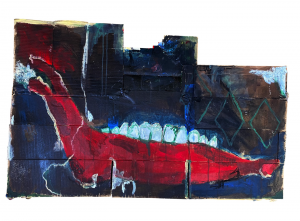
“Mandible,” by Oona Dederer. Photo Credit: Elliot Hueske.
The numerous manifestations of stress are all becoming more salient to us. Whether we are feeling agitated, having trouble focusing, losing sleep, or clenching our jaws, the anxiety of our current historical period is reflected in our mental and physical health. Daily life is seemingly defined by a constant inundation with unsettling and anxiety-provoking news concerning international conflict, the COVID-19 pandemic, attacks on marginalized community groups, and numerous additional emotionally demanding experiences. Negatively valenced stimuli interrogate the psychological and physical well-being of individuals, for example, with respect to the attacks on female bodily autonomy by the overturning of Roe v. Wade. Moreover, recent assaults to community well-being through acts of violence continue to plague the nation. Such a vicious besiege of human rights violations is simply incomprehensible. However, through studying psychology I have recognized the important association between improved psychological health and a modified perspectives when interpreting such stimuli. Instead of allowing adverse feelings to become overwhelming, it is beneficial to integrate contextual information and subjective experience to effectively incorporate such events in a mental repository. While not foolproof, this technique can help us continue functioning without allowing these experiences to become debilitating. For me, such cognitive activity has been largely assisted by the texts and class discussions of Columbia’s Core courses, particularly Contemporary Civilization (CC). My engagement with the texts in the CC syllabus encouraged me to analyze and interrogate historical events in an effort to work toward concrete actions to improve our future and safeguard the rights of subsequent generations. I implore Columbia students to approach Core classes not with a perspective of checking an item off a list of requirements, but with the mindset that successfully completing them will equip you with critical tools in which to interpret and navigate your world.
For example, my CC class witnessed the January 6 Capitol Hill attack. This event was deeply troubling for the majority of the class and my peers expressed their concerns that democratic foundations were crumbling, while any sense of accountability was seemingly lost. At the time we were studying John Stuart Mill’s on Liberty and Marx’s The Communist Manifesto which, although ideologically distinct, allowed us to characterize attacks on liberty. Putting the authors in dialogue with each other was a meaningful exercise. In smaller groups, we came to recognize that both authors generally agree that assaults to human rights are contingent on the customs of a society. We then questioned whether this permitted us to place the recent Capitol Hill attacks in context with a rigorously bipartisan cultural and political environment. We also considered the implications of America’s history of colonialism and suppression manifesting in this event. Despite significant variation between the texts, Marx asserts that liberty is “the right to do everything which does not harm others” which is similarly articulated by Mill. While Marx’s interlocuters may criticize this statement for being too broad, it became increasingly more relevant after witnessing the direct abuses to well-being occurring in front of us. It was not simply bipartisan division, but an even more extreme and misinformed notion of social exclusion that was severely disconnecting our country. Yet the texts that we were engaging with emphasized the necessity of an enhanced sense of community to avoid a descent into societal isolation. To extend this conversation, we incorporated Alexis de Tocqueville’s Democracy in America. De Tocqueville asserts that humans are becoming increasingly more detached from each other by establishing artificial boundaries between groups. Moreover, he argues that egoism makes individuals retreat from the political sphere and become less committed to their country. The polarization and hierarchies that characterized this moment in time and continue to threaten communities today were heightened in relevance by these class discussions.
In addition to analyzing the origins of such actions, we also contemplated potential solutions in which to advocate for forming politically active communities. The type of idealized society envisioned by Marx is a kind of utopia. Yet so is the world imagined by Charles Darwin in On the Origin of Species. Darwin visualizes an environment of cohabitation and emphasizes the production of bonds of association. In a somewhat sobering tone, he questions the loss of human unity: “Why do we not see these linking forms all around us? Why are not all organic beings blended together in an inextricable chaos?” Therefore, we read Darwin as proposing claims of radical social unification, rather than strictly as a biologist. CC discussions provided the necessary material in which to cope with and comprehend the events transpiring. Not only were we identifying motifs and themes in the texts, but we were connecting them to our present moment in a way that made it feel less overwhelming. By translating the concepts of great thinkers and interpreting the world through modified versions of these ideas, I began to feel less stressed, to sleep a bit sounder, to unclench my jaw—if only a little.
